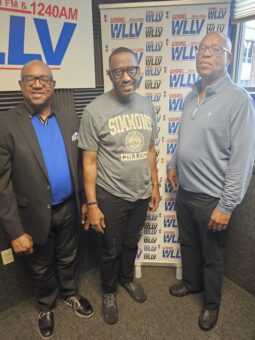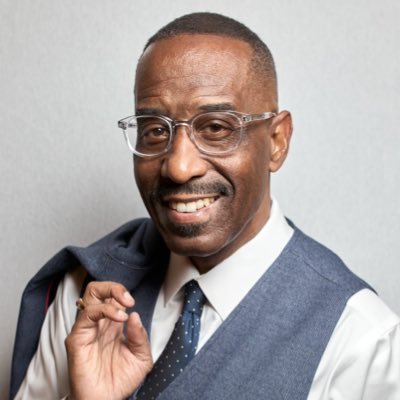Introduction:
I n the latest episode of “Russell On The Move,” hosts Kevin Fields and Herbert Johnson engage in a thought-provoking conversation with the Rev. Dr. Kevin W. Cosby, shedding light on themes taken from his latest book, “Getting to the Promised Land: Black America and the Unfinished Work of the Civil Rights Movement.” Drawing inspiration from Martin Luther King Jr.’s last speech, Dr. Cosby delves into the significance of this vision and its implications for Black Americans in their quest for equality and economic mobility. This blog post aims to unpack the key discussion points highlighted during this insightful interview.
n the latest episode of “Russell On The Move,” hosts Kevin Fields and Herbert Johnson engage in a thought-provoking conversation with the Rev. Dr. Kevin W. Cosby, shedding light on themes taken from his latest book, “Getting to the Promised Land: Black America and the Unfinished Work of the Civil Rights Movement.” Drawing inspiration from Martin Luther King Jr.’s last speech, Dr. Cosby delves into the significance of this vision and its implications for Black Americans in their quest for equality and economic mobility. This blog post aims to unpack the key discussion points highlighted during this insightful interview.
Defining the Promised Land:
At the heart of Dr. Cosby’s conversation lies the need to define what the Promised Land means for black Americans. Going beyond mere diversity, equity, and inclusion efforts, he emphasizes that it represents economic parity and the fair distribution of wealth, resources, and power. It symbolizes the full realization of Dr. King’s vision for a society where every individual is treated equally and provided with opportunities for growth and success.
The Injustice(s) of Public Policy:
Dr. Cosby delves into the “INJUSTICE” of public policy that have hindered the progress and access to economic opportunities for the American Descendants of Slavery (ADOS). He acrostically highlights several key points regarding these injustices:
- I – Image of Black People
- N – Narrative of Black People
- J – Jim Crow Laws
- U – Urban Renewal
- S – Slavery
- T – Terrorism
- I – Investment
- C – Cops/Courts
- E – Economic Exclusion
Historical Context:
To understand the present state of Black America, it is crucial to recognize the historical struggles and contributions of the community. Dr. Cosby sheds light on how Black people played a significant role in building the United States through their uncompensated labor during slavery. Their cultural influence and advocacy have been instrumental in shaping American democracy. However, the journey towards the promised land has been hindered by systemic inequalities and the co-optation of Black leaders into mainstream American life.
The Role of Education:
Education has always been a powerful tool for empowerment, and Dr. Cosby emphasizes its significance in the pursuit of the promised land. He highlights the historical limitations imposed upon Black students through legislation like the Day Law, which segregated education and limited their options. Moreover, he showcases how Historically Black Colleges and Universities (HBCUs), such as Simmons College of Kentucky, have served as economic engines by attracting federal funding and students from all over the nation.
Scholarships at Simmons College:
In the conversation, Dr. Cosby praises the Evolve 502 program in Louisville that offers free tuition opportunity at Simmons, providing young people with opportunities for upward mobility. He discusses how this program goes beyond ministerial education, offering practical classes with immediate employment prospects. The program’s partnership with local universities, allowing the transfer of credits, further enhances the potential for students to access higher education.
Expanding the Conversation:
Dr. Cosby and Kevin Fields recognize the need to extend the discourse beyond the specific concerns of black Americans. While acknowledging the intersectionality of various causes, they underscore that economic justice should be accessible to every person, regardless of their background. They shed light on how the civil rights movement addressed not only the redress of Black Americans but also other marginalized groups, like the poor, women, the LGBTQI community, immigrants, and people with disabilities.
Potential for Progress:
Despite the challenges and setbacks faced by black Americans in their pursuit of the Promised Land, Dr. Cosby and Kevin Fields remain optimistic about the potential for progress. They draw attention to notable figures like Dr. Cornell West, who continue to advocate for marginalized communities, and highlight the economic impact of Simmons College on Louisville. Dr. Cosby’s dedication to the institution, its expansion, and the success of its students serve as a testament to the possibilities for upliftment and change.
Conclusion:
The interview with Dr. Kevin W. Cosby on “Russell On The Move” provides valuable insights into the concept of “Getting to the Promised Land” and its significance for Black Americans. It underscores the need for economic parity, equitable resource distribution, and the fair access to opportunities for all individuals, especially ADOS. By acknowledging the historical context, promoting educational initiatives like Simmons College of Kentucky, and recognizing the potential for progress, this conversation inspires listeners to contribute to the ongoing journey toward realizing the “Promised Land” of equality and economic mobility.
Click below to listen to the entire podcast:
